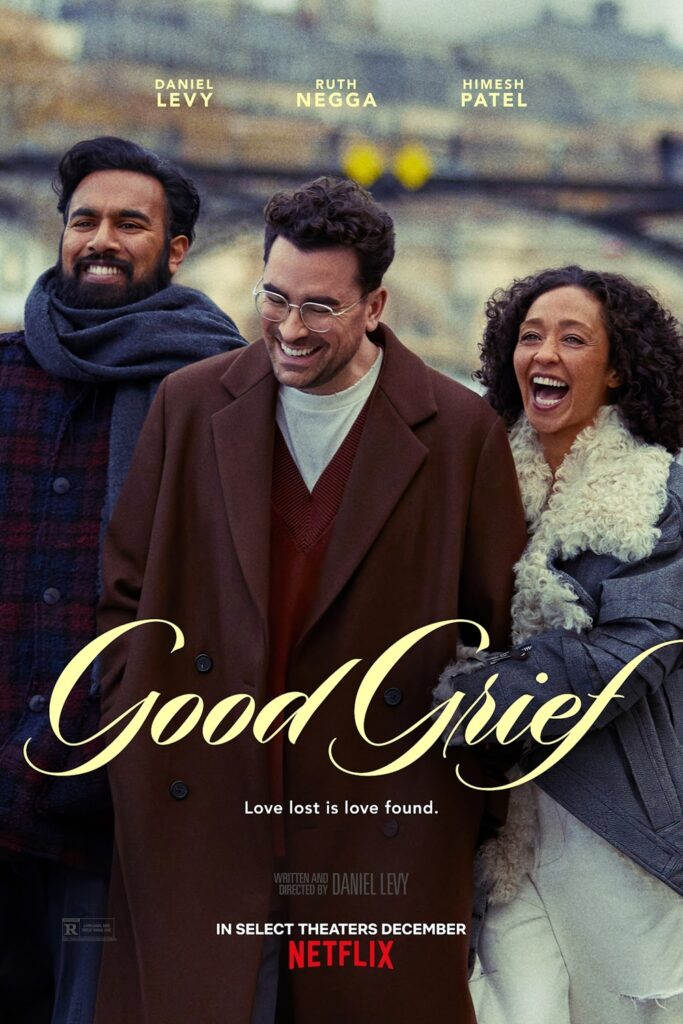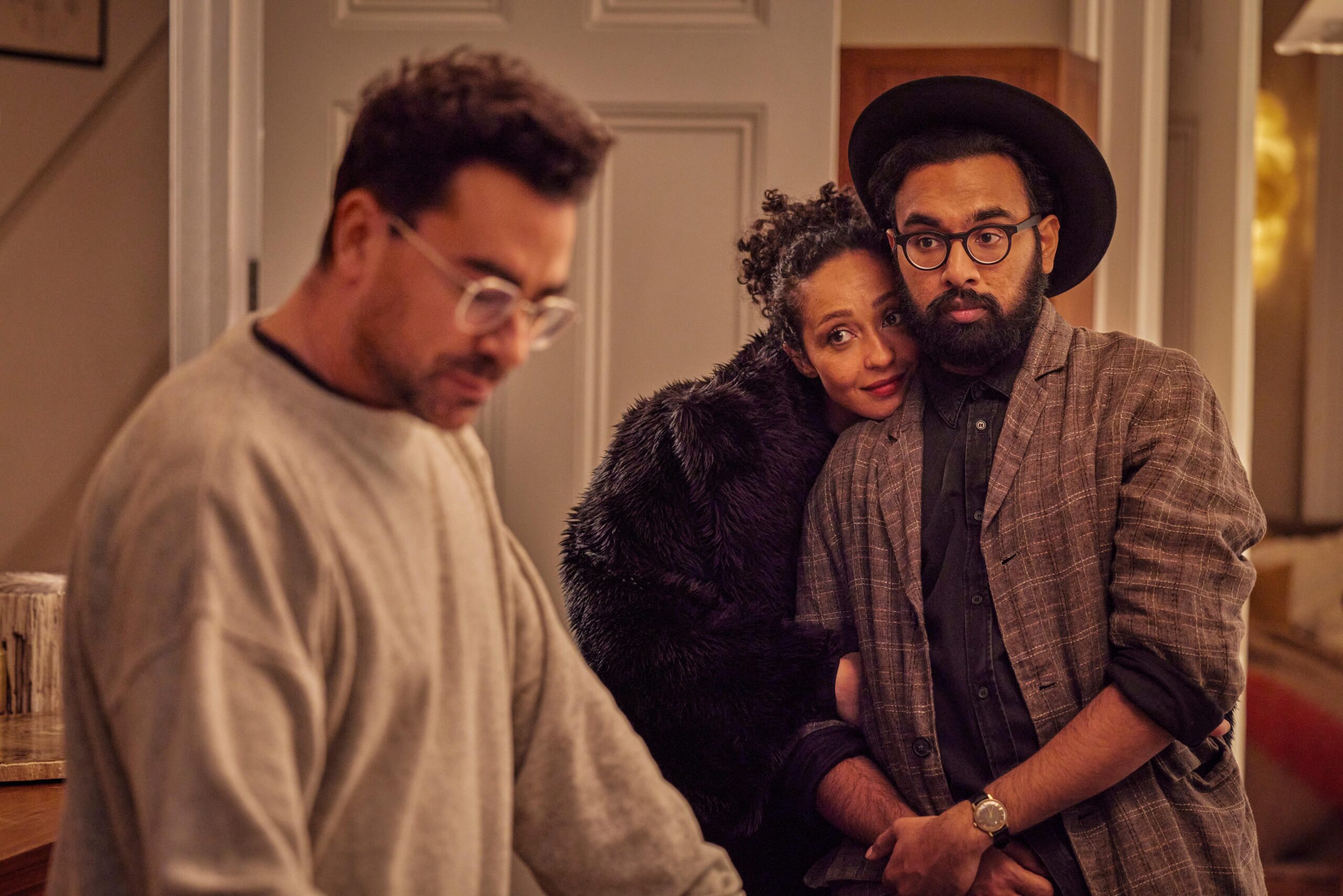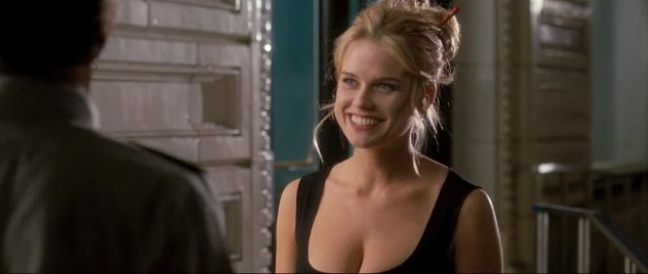Schitt’s Creek co-creator, Dan Levy, brings us an authentic tale of complicated love, gut-wrenching loss and anguished healing in his directorial debut, Good Grief – currently streaming on Netflix. Serving as writer, director, producer and lead actor in the comedy-drama, Good Grief serves as a reminder of the well-rounded talents of Levy himself, above all else. Yet, the film arguably leaves viewers wanting more – and not in the way Levy may have intended.
Good Grief sees Dan Levy play the role of Marc Dreyfus; a married painter turned children’s book illustrator struggling to deal with the losses of his husband and mother. The film follows Marc’s grief alongside his ragtag best friends, Thomas (Himesh Patel) and Sophie (Ruth Negga), each with their own problems in love. While Marc combats the sheer emptiness that comes with the tragic death of your other half, Thomas ponders why he is unable to form such a connection of his own, while Sophie struggles to appreciate what she has already found.
The film opens with a lavish and bustling Christmas party, hosted by Marc’s husband Oliver – played by the wonderful Luke Evans. One of the great successes of Good Grief as a story is their ability to give Oliver so much presence and character in such a short space of time on screen. The audience walks into the movie knowing from the title and synopsis that Luke Evans is not long for this world, which makes the task of an emotional death all the more challenging. By painting him as the life and soul of the party, as well as an extremely generous sharer of his love, Good Grief leaves a hole not only for Marc but also for the viewer upon Oliver’s death. Life and soul. Then silence. Words of affirmation. Then silence. Love. Then silence.

Unfortunately, where the film falls a little is the aftermath of that traumatic Christmassy evening. Beyond a few shots of Marc struggling to get out of bed and some heartfelt monologues, we don’t really see or feel the heartrending horror of the situation that I think we needed as viewers. While the film is more about the latter grief and healing process, I found myself calling for a gut punch and a tear-jerk along the way. The movie and the story deserved an iconic scene or two to take the viewer on a journey with Marc. In the end, it felt more like watching his grief through a window, rather than feeling every lurch and retch and clot along with the character. One moment I must commend Levy on though is the Christmas letter (no spoilers). In a film that lacked memorable moments, that was certainly one.
Instead, we are taken on a trip to Paris where Marc seeks to both move on from his grief and also uncover the secrets of Oliver’s life. With Thomas and Sophie in tow, the three amigos stumble their way through the cobbled French streets, and each reach their own level of epiphany come the end of the trip. In terms of a beginning, middle and end for each of our three main characters, we are treated to some well-intentioned and authentic growth, centered around an honest desire for healing. The film gets a little bogged down in repetitive conversations, monologues, and comedic relief that falls flat more often than not.

While Good Grief focuses primarily on our central trio, Marc, Thomas and Sophie – it is two other actors who arguably go down as book-ended scene-stealers across the 100-minute run time. Legendary actor, David Bradley, gives a memorable speech at Oliver’s funeral as he opens up on the mistakes he made as a father coming to terms with his son’s sexuality. Fast forward to one of the final scenes and the iconic Celia Imrie delivers a hard-hitting statement on loss and recovery in conversation with Marc. I only wish that we, as an audience, had been shown more grief in between those scenes, rather than being told about it so consistently. While the extravagant backdrop of million-dollar London and Paris apartments made for some beautiful shooting locations, I also can’t help but wonder whether it detracted from the power of the story, without truly examining how wealth influences love, loss, and the grieving process. Perhaps removing Marc from the extravagance we already associated with David Rose (Schitt’s Creek), Good Grief could have injected more of an emotional connection from screen to viewer.
The individual performances of Levy, Patel and Negga are the driving force of Good Grief, keeping the audience interested at times when the story failed to do so. All-in-all, you can’t help but leave wanting more from a film that neither quite makes you cry nor quite makes you laugh. More a heart-warming and honest exploration of the definition of grief, without the visual representation of what that grief feels like.
Dan Levy has more than proved his ability to carve meaningful characters and weave rich tapestries of change across six seasons of Schitt’s Creek. While Good Grief represents a promising dip of a toe into the directorial world, I cannot wait to see what comes next from someone who clearly has an abundance of very human stories to tell.






